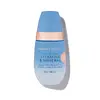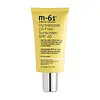What's inside
What's inside
 Key Ingredients
Key Ingredients

 Benefits
Benefits

 Concerns
Concerns

 Ingredients Side-by-side
Ingredients Side-by-side

Zinc Oxide 12%
Cosmetic ColorantWater
Skin ConditioningC12-15 Alkyl Benzoate
AntimicrobialCaprylic/Capric Triglyceride
MaskingJojoba Esters
EmollientTridecyl Salicylate
Skin ConditioningPropanediol
SolventPolyglyceryl-4 Diisostearate/Polyhydroxystearate/Sebacate
EmulsifyingNiacinamide
SmoothingMethylpropanediol
SolventSilica
AbrasiveNylon-12
Coco-Caprylate
EmollientTulipa Gesneriana/Kaurmanniana Meristem Cell Lysate Filtrate Extract
Helianthus Annuus Extract
EmollientGlycerin
HumectantSodium Hyaluronate
HumectantSodium Lactate
BufferingBisabolol
MaskingAllantoin
Skin ConditioningOryza Sativa Bran Extract
Skin ConditioningTocopherol
AntioxidantLentinus Edodes Extract
Skin ConditioningTerminalia Ferdinandiana Fruit Extract
AntioxidantPodocarpus Elatus Fruit Extract
Skin ConditioningPleiogynium Timoriense Fruit Extract
Skin ConditioningLecithin
EmollientHydrogenated Lecithin
EmulsifyingLeuconostoc/Radish Root Ferment Filtrate
AntimicrobialRosmarinus Officinalis Leaf Extract
AntimicrobialSodium Chloride
MaskingPolyglyceryl-2 Dipolyhydroxystearate
Skin ConditioningCaprylyl Glycol
EmollientMethylheptyl Isostearate
Skin ConditioningPhenylpropanol
MaskingTetrasodium Glutamate Diacetate
Sodium Gluconate
Skin ConditioningPentylene Glycol
Skin ConditioningSodium Hydroxide
BufferingPhenethyl Alcohol
MaskingPotassium Sorbate
PreservativeAlcohol
AntimicrobialHamamelis Virginiana Water
AstringentCitric Acid
BufferingCI 77499
Cosmetic ColorantCI 77492
Cosmetic ColorantCI 77491
Cosmetic ColorantZinc Oxide 12%, Water, C12-15 Alkyl Benzoate, Caprylic/Capric Triglyceride, Jojoba Esters, Tridecyl Salicylate, Propanediol, Polyglyceryl-4 Diisostearate/Polyhydroxystearate/Sebacate, Niacinamide, Methylpropanediol, Silica, Nylon-12, Coco-Caprylate, Tulipa Gesneriana/Kaurmanniana Meristem Cell Lysate Filtrate Extract, Helianthus Annuus Extract, Glycerin, Sodium Hyaluronate, Sodium Lactate, Bisabolol, Allantoin, Oryza Sativa Bran Extract, Tocopherol, Lentinus Edodes Extract, Terminalia Ferdinandiana Fruit Extract, Podocarpus Elatus Fruit Extract, Pleiogynium Timoriense Fruit Extract, Lecithin, Hydrogenated Lecithin, Leuconostoc/Radish Root Ferment Filtrate, Rosmarinus Officinalis Leaf Extract, Sodium Chloride, Polyglyceryl-2 Dipolyhydroxystearate, Caprylyl Glycol, Methylheptyl Isostearate, Phenylpropanol, Tetrasodium Glutamate Diacetate, Sodium Gluconate, Pentylene Glycol, Sodium Hydroxide, Phenethyl Alcohol, Potassium Sorbate, Alcohol, Hamamelis Virginiana Water, Citric Acid, CI 77499, CI 77492, CI 77491
Homosalate 14.5%
Skin ConditioningEthylhexyl Salicylate 5%
UV AbsorberButyl Methoxydibenzoylmethane 3%
UV AbsorberWater
Skin ConditioningOctyldodecyl Neopentanoate
EmollientGlycerin
HumectantHdi/PPG/Polycaprolactone Crosspolymer
Butyloctyl Salicylate
Skin ConditioningPropanediol
SolventSorbeth-30 Tetraisostearate
EmulsifyingIsododecane
EmollientVp/Eicosene Copolymer
Vp/Acrylates/Lauryl Methacrylate Copolymer
Triacontanyl Pvp
HumectantVp/Hexadecene Copolymer
Alcohol
AntimicrobialAcetyl Hexapeptide-8
HumectantPanthenol
Skin ConditioningSodium Hyaluronate
HumectantAloe Barbadensis Leaf Extract
EmollientTamarindus Indica Fruit Extract
Skin ConditioningCentella Asiatica Extract
CleansingPotassium Sorbate
PreservativePotassium Hydroxide
BufferingPhenoxyethanol
PreservativeSorbitan Sesquiisostearate
EmulsifyingPPG-8-Ceteth-20
EmulsifyingAcrylates/Beheneth-25 Methacrylate Copolymer
Dipropylene Glycol
HumectantDisodium EDTA
Hydroxyethylcellulose
Emulsion StabilisingHomosalate 14.5%, Ethylhexyl Salicylate 5%, Butyl Methoxydibenzoylmethane 3%, Water, Octyldodecyl Neopentanoate, Glycerin, Hdi/PPG/Polycaprolactone Crosspolymer, Butyloctyl Salicylate, Propanediol, Sorbeth-30 Tetraisostearate, Isododecane, Vp/Eicosene Copolymer, Vp/Acrylates/Lauryl Methacrylate Copolymer, Triacontanyl Pvp, Vp/Hexadecene Copolymer, Alcohol, Acetyl Hexapeptide-8, Panthenol, Sodium Hyaluronate, Aloe Barbadensis Leaf Extract, Tamarindus Indica Fruit Extract, Centella Asiatica Extract, Potassium Sorbate, Potassium Hydroxide, Phenoxyethanol, Sorbitan Sesquiisostearate, PPG-8-Ceteth-20, Acrylates/Beheneth-25 Methacrylate Copolymer, Dipropylene Glycol, Disodium EDTA, Hydroxyethylcellulose
 Reviews
Reviews

Ingredients Explained
These ingredients are found in both products.
Ingredients higher up in an ingredient list are typically present in a larger amount.
Alcohol comes in many different forms. Different types of alcohol will have different effects on skin. This ingredient is usually an astringent alcohol.
These alcohols are drying on the skin. They may strip away your skin's natural oils and even damage your skin barrier. Astringent alcohols may also irritate skin.
Other types of astringent alcohols include:
According to the National Rosacea Society based in the US, you should be mindful of products with these alcohols in the top half of ingredients.
Any type of sanitizing product will have high amounts of alcohol to help kill bacteria and viruses.
Fatty alcohols come from plant oils such as coconut oil. These can help hydrate the skin and are non-irritating. Some fatty alcohols include cetyl and stearyl alcohol.
Learn more about AlcoholGlycerin is already naturally found in your skin. It helps moisturize and protect your skin.
A study from 2016 found glycerin to be more effective as a humectant than AHAs and hyaluronic acid.
As a humectant, it helps the skin stay hydrated by pulling moisture to your skin. The low molecular weight of glycerin allows it to pull moisture into the deeper layers of your skin.
Hydrated skin improves your skin barrier; Your skin barrier helps protect against irritants and bacteria.
Glycerin has also been found to have antimicrobial and antiviral properties. Due to these properties, glycerin is often used in wound and burn treatments.
In cosmetics, glycerin is usually derived from plants such as soybean or palm. However, it can also be sourced from animals, such as tallow or animal fat.
This ingredient is organic, colorless, odorless, and non-toxic.
Glycerin is the name for this ingredient in American English. British English uses Glycerol/Glycerine.
Learn more about GlycerinPotassium Sorbate is a preservative used to prevent yeast and mold in products. It is commonly found in both cosmetic and food products.
This ingredient comes from potassium salt derived from sorbic acid. Sorbic acid is a natural antibiotic and effective against fungus.
Both potassium sorbate and sorbic acid can be found in baked goods, cheeses, dried meats, dried fruit, ice cream, pickles, wine, yogurt, and more.
You'll often find this ingredient used with other preservatives.
Learn more about Potassium SorbatePropanediol is an all-star ingredient. It softens, hydrates, and smooths the skin.
It’s often used to:
Propanediol is not likely to cause sensitivity and considered safe to use. It is derived from corn or petroleum with a clear color and no scent.
Learn more about PropanediolSodium Hyaluronate is hyaluronic acid's salt form. It is commonly derived from the sodium salt of hyaluronic acid.
Like hyaluronic acid, it is great at holding water and acts as a humectant. This makes it a great skin hydrating ingredient.
Sodium Hyaluronate is naturally occurring in our bodies and is mostly found in eye fluid and joints.
These are some other common types of Hyaluronic Acid:
Learn more about Sodium HyaluronateWater. It's the most common cosmetic ingredient of all. You'll usually see it at the top of ingredient lists, meaning that it makes up the largest part of the product.
So why is it so popular? Water most often acts as a solvent - this means that it helps dissolve other ingredients into the formulation.
You'll also recognize water as that liquid we all need to stay alive. If you see this, drink a glass of water. Stay hydrated!
Learn more about Water